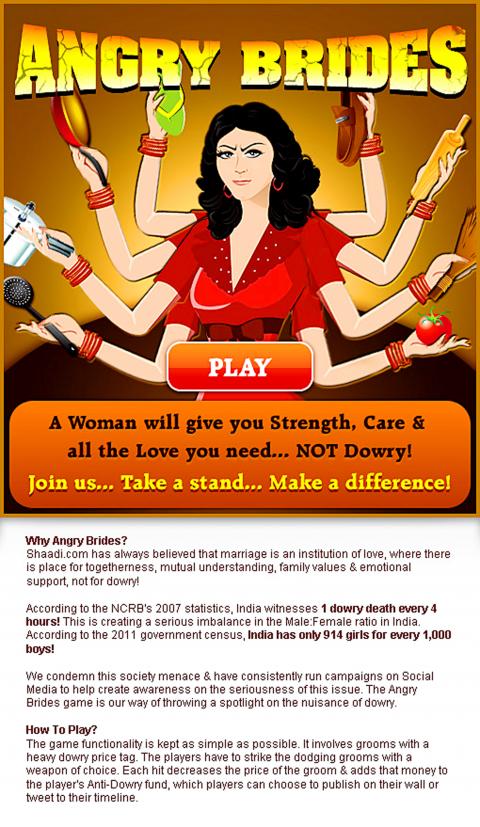An online game in India called “Angry Brides” which wages war on dowry and seeks to highlight the problem of illegal dowry demands has attracted more than 272,000 fans.
The game by online matchmaker Shaadi.com — inspired by the hugely popular “Angry Birds” game — sees players attack prospective grooms greedy for dowry with a variety of weapons, from a brick-red stiletto to a broomstick.
The three grooms — an engineer, a doctor and a pilot — dodge the attacks while demanding dowries starting at 1.5 million rupees (NT$898,000). Each time a player hits a groom, he or she wins money towards a virtual anti-dowry fund.

Photo: AFP
照片:法新社
The game, available as a free application on Facebook, has already attracted more than 272,000 “likes.”
Paying and accepting a dowry in India has been illegal since 1961, but the centuries-old tradition of the bride’s parents presenting gifts of cash, clothes, jewellery and even appliances to the groom’s family remains strong.
Demands for dowry often persist well past the wedding ceremonies, and in the worst cases brides are tortured and even murdered if they or their parents do not comply.
(AFP)

Photo: Taipei Times
照片:台北時報
印度一款名為「憤怒新娘」的線上遊戲,旨在向嫁妝陋習宣戰並凸顯非法索取嫁妝帶來的問題,吸引了逾二十七萬兩千名粉絲。
這款遊戲由婚友網站Shaadi.com推出,靈感來自廣受歡迎的「憤怒鳥」遊戲,玩家可使用從磚紅色細高跟鞋到帚柄等各式武器來攻擊貪求嫁妝的準新郎。
遊戲中的三位新郎分別是工程師、醫生和飛行員。他們一邊索求一百五十萬盧比(新台幣八十九萬八千元)起跳的嫁妝,一邊躲避著玩家的進攻。玩家每擊中新郎一次,他或她就會贏得一筆虛擬的反嫁妝資金。
這款遊戲在臉書上是一款免費應用程式,已吸引了超過二十七萬兩千人按「讚」。
從一九六一年至今,收送嫁妝在印度都是違法的,但是新娘的父母向新郎家庭贈送現金、衣服、珠寶甚至器具等禮物的傳統已有幾世紀之久,至今依然盛行。
索取嫁妝的情況就算在婚禮後也揮之不去,在最壞的情況下,如果新娘或她們的父母不給嫁妝,新娘就會受到折磨甚至被謀殺。
(法新社/翻譯:陳成良)

Denmark’s state-run postal service, PostNord, announced that it would cease letter deliveries at the end of 2025 due to the impact of digitalization. As 95% of its residents now use the Digital Post service, Denmark has seen a 90% decline in letter volumes since 2000, from 1.4 billion to 110 million last year. On top of that, the Postal Act of 2024 removes the government’s obligation to provide universal mail service and puts an end to postal exemptions from value-added tax, raising the cost of a single letter to 29 Danish krone (US$4.20). As a result, PostNord is switching

Bilingual Story is a fictionalized account. 雙語故事部分內容純屬虛構。 “One DA-BEI... WU LONG... NAI?” Yujing smiled as the foreigner struggled to order. He looked like an embarrassed puppy. She repeated the order in Chinese, then English: “Oolong milk tea, large size. Half sweet, no ice?” she said gently. He beamed — the kind of full-face, sunshine smile that Latinos are famous for. “Yes! That! You are... lo maximo… the best!” After he left, Lily nudged her. “Nice save. You’re getting the hang of it.” Yujing had taken this summer job at the bubble tea shop to build confidence and get work

When you think of the Netherlands, images of tulips, windmills, and iconic wooden shoes — known as “Dutch clogs” — may come to mind. These traditional shoes are rich in cultural significance. For centuries, Dutch clogs have been admired for their sturdy design and impressive craftsmanship, making them a fascinating symbol of Dutch heritage. Dutch clogs date back to the Middle Ages. During that time, farmers and laborers needed durable shoes to cope with the region’s damp and unpredictable climate and topography. Crafted from solid wood, such as willow or poplar, clogs offered outstanding protection. Their firm structure kept

Although sending you an SMS (Short Message Service) verification code provides some security, many apps now use code-generating apps and two-factor authentication instead. But more recently, passkeys now use a biometric approach to logging in. Biometrics can offer an even more secure alternative. Following this trend, Google is reportedly planning to replace SMS verification codes with “QR code” scanning. SMS codes are currently used to verify user identity and prevent fraudsters from creating fake Gmail accounts to distribute spam. However, these codes present several challenges. They can be phished through suspicious links, and users may not always have access